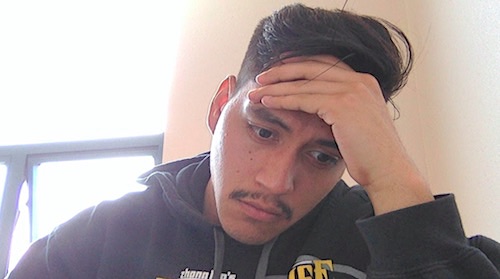Anxiety Grips California Students Amid Immigration Crackdown

*Why you should read this: Because the anxiety is real and not just in California. VL
By Claudia Boyd-Barrett, New America Media (6.5 minute read) 
Each time 17-year-old Stephanie gets a call or text message on her cell phone at school, her heart starts pounding and her hands begin to sweat.
“I think, ‘Oh my God, they took them. This is it,’” said the Ventura County high school student. “I can’t concentrate on what’s going on.”
While at school, Stephanie texts her mom constantly to check on her, something she never used to do. At home, she races to be the person to answer each time the phone rings or there’s a knock at the door. Late at night, she lies awake wondering how she’ll take care of her two younger siblings if her parents get deported.
Stephanie, who asked that her last name not be used to protect her parents, is among an estimated 700,000 public school students in California with at least one undocumented parent. About 12.3 percent of K-12 students in California have at least one undocumented parent, according to the Public Policy Institute of California.
Amid news of stepped-up deportation efforts under President Donald Trump, many of these students are living in fear that their families will be torn apart. School counselors report high levels of anxiety and stress among students from immigrant families, which affects the students’ ability to do schoolwork and pay attention in class.
“There’s a lot of fear. The families are fearful, there are rumors, concerns about immigration (agents) coming into the school campuses. There’s concerns about, if (kids) come to school, their parents will be gone when they get back,” said Loretta Whitson, executive director of the California Association of School Counselors which represents about 9,000 school counselors across the state. “It seems to be a disturbing time.”
Immigration arrests up
Trump has vowed to deport millions of undocumented immigrants and signed an executive order expanding the criteria for deportation to include most people in the country illegally, not just those with criminal backgrounds. Although deportations also happened under the Obama administration, it appears immigration authorities have begun to cast a wider net when it comes to detaining undocumented immigrants. Data show that the federal Immigration and Customs Enforcement has already arrested more immigrants in 2017 than in the previous year.
There have been reports of parents detained by immigration agents while dropping off or picking their kids up from school, and of immigration agents rounding up immigrants at other sensitive locations such as courthouses. New reports suggest young people previously protected under the Obama-era Deferred Action for Childhood Arrivals program have also been deported after their protective status has expired.
Across the state, 57 schools have sought to calm undocumented families’ fears by declaring themselves “safe havens” for immigrant children, according to the California Department of Education. Schools that are safe havens say they will not allow immigration agents onto school grounds, and will continue to welcome all children regardless of immigration status. Some school districts have offered additional help for undocumented families, such as legal workshops or counseling. The Los Angeles Unified School District, the largest district in the state, has set up a hotline and support sites for parents and students where they can obtain information and emotional support if they’re worried about deportation.
The largely Latino Oxnard Union High School District has worked to ensure counselors are available to students in the aftermath of Trump’s election victory, said Penelope DeLeon, superintendent of the district. In November, students in the district staged protests in opposition to the president. The district has declared itself a safe haven.
“Our counselors have been definitely (instructed) around what the issues are,” DeLeon said. “Everybody is very sensitive to it. What we want is for our students to feel safe at school and be able to continue on with their studies in a productive and positive way.”
Anxiety affects ability to learn
Despite school district efforts, student anxiety around immigration issues continues to run high throughout the state, counselors said. Eric Blanco, a counselor at Ernest Righetti High School in Santa Maria and president of the California Association of School Counselors said some students are afraid to let guidance counselors know that they don’t have legal residency. That can make it difficult for counselors advising students on higher education and financial aid opportunities to supply them with information that can help them get to college, he said. Other students may decide to forgo college altogether out of fear of revealing they’re undocumented, Blanco said.
For students in lower grades, fears around immigration can be particularly severe, Whitson said. Elementary school-age children, for example, have a harder time assessing risk and making sense of the news and rumors they hear around them, she said. Constant fearfulness is detrimental to students’ mental health and academic success, she said.
“Research shows that fear interferes with students’ ability to learn. So any kind of anxiety or fear just makes it that much more difficult to function, if not impossible,” she said. “I have heard of students having so much anxiety they can’t stay in the classroom. They’re in the counselor’s office because they’re just anxious.”
At McKevett Elementary School in Santa Paula, an area with a large migrant farmworker population, school counselor David Braff said children there regularly tell him they’re afraid about family members being taken. In the aftermath of Trump’s election victory, students would approach him — sometimes in tears — to ask if they would have to leave the country, he said. Anxiety levels have decreased since then, he said, but students still come to him with immigration-related concerns.
“Most of the kids have been watching the news and been listening to what their parents tell them, and I think that’s putting more fear into them,” he said.
“I just focus on their feelings, how they’re feeling about it, and try to reassure them … I tell them, you know what, while you’re here at school, you’re safe here at school and your parents are safe.”
‘Will everything be OK?’
Bullying and harassment of students related to race and immigration status have also spiked since Trump’s election victory, according to the California Department of Education. In Ventura County alone, several such incidents have made headlines in recent months, including students at a Ventura high school posting racist photographs and a Simi Valley student yelling “build a wall” at an opposing team during a volleyball match.
Blanco said he’s spoken with counselors at the elementary and middle school levels who are dealing with kids teasing each other about immigration and diversity issues. He said students appear to be mimicking what they see in the media regarding treatment of immigrants and other minority groups. Counselors respond by trying to teach the victims coping skills while also working to increase sensitivity around diversity in the broader student population, he said.
Last month, the California Association of School Counselors hosted its first ever conference about students and immigration concerns, Whitson said. The association is also creating a “safe space” sticker for counselors to put in their offices to indicate to students that they can talk about their immigration status without fear the information will be shared, she said.
For Stephanie, dreams about going to college have been overshadowed by daily panic about her family’s future. A straight-A student, the 17-year-old said she now has a hard time focusing on her schoolwork.
As well as worrying about her parents getting deported, she is fearful she won’t be able to renew her own temporary legal status granted under the Obama era’s Deferred Action for Childhood Arrivals policy. Stephanie said her parents brought her to the United States from Mexico when she was 1 year old. Trump’s plans for DACA recipients remain unclear.
“It’s very discouraging now because before you had that mentality that you can get through this, you can succeed,” said Stephanie. “Now every day when I wake up I think, ‘Will everything be OK today or will it not?’”
This article was originally published in New America Media.
Do you like stories that reflect authentic Latino life in the U.S.?
Be part of a positive change
![]() New America Media
New America Media

